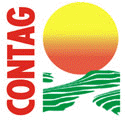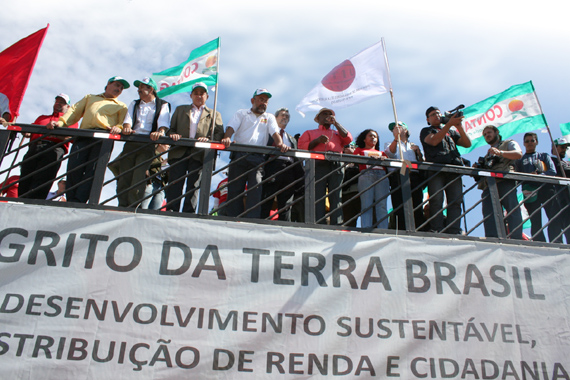|
|
Brasil |
 |
Grito da Terra Brasil
2008
|

|
With Manoel José dos Santos, of the CONTAG
A positive balance that encourages us to continue in our struggle |
|
|
|
Manoel
dos Santos, president and emblematic figure of the National
Confederation of Agricultural Workers of Brazil (CONTAG), spoke with
Sirel when echoes of the rally that closed the Grito da Terra
2008 were still being heard, a few minutes after a negotiation
meeting with President Lula.
-What is your evaluation of the Grito da Terra (Cry of the
Earth) Brazil 2008?
-Very positive in many aspects. In the first place because of the
process of preparatory discussions conducted in every municipality,
which mobilized more than 100 thousand people who participated in
everything, from the drafting of a platform of demands, to efforts
to raise funds to get to Brasilia from every state in the country,
which in some cases entailed traveling for two or three days and
then another two or three days to return. Another positive aspect is
that we were able to present a broad platform, with a lot of items,
but at the same time with very well-defined main points.
-What did you obtain in these negotiations?
-In
the first place, the government’s commitment to begin discussing a
policy to support the rural workers that will lose their jobs as a
result of the process of mechanization of certain tasks, with the
aim of including them in specific programs that will enable their
reintegration as workers. This is a long-standing demand of ours,
which the government has for the first time agreed to consider.
-What was the budgetary agreement this time?
-We
are satisfied with the funds obtained for the 2008-2009 harvest, to
support credits for family agriculture. In connection with this, the
sum that will be allocated to technical assistance was set, and this
will guarantee that better projects will be implemented and farmers
will receive support for production, thus resulting in fewer
indebted producers.
We
have also renegotiated the debt of 600 thousand loans, which means
that a significant number of family farmers will have access to
credits once again. We must also highlight the reduction in the
interest rates of agricultural credits of the federal government,
which will now stand at 2 to 5 percent. The government has also
undertaken to admit 120 thousand families in the agrarian reform
programs of the INCRA and 20 thousand more under the
agriculture credit scheme, all within this year.
Moreover, we formalized the government’s commitment to do everything
possible to stop the judicial foreclosure of lands owned by indebted
family producers, and to achieve the regularization of short-term
rural employment and the inclusion of temporary rural workers, who
often lack social security coverage.
|
In
the meeting with the government, we said we wanted to discuss the
concept of development, as the current model is highly oriented
towards the large corporations, the large exporting companies, and
family agriculture is left with increasingly less land, less credits
and greater difficulties |
-In
the opening ceremony of the Grito da Terra, you announced the
launching of a national and international campaign to “combat the
global ethanol oligarchy.” Could you explain this a little bit more?
-There are several points in which we have not reached an agreement.
For example, we weren’t able to convince the government to
immediately modify the index of productivity of the large landed
estates, although it did agree to examine this matter. These indexes
were set 40 years ago and they no longer bear any relation to
reality, so that many large landowners are passing their lands off
as productive to keep them out of the list of agrarian reform lands.
In connection with this, we are witnessing a process of sugar cane
crop expansion throughout the country, but especially in the south
eastern and middle eastern regions. Forty ethanol and sugar
processing plants are planned for Sao Paulo alone. The
mechanization of harvesting tasks was agreed under the Environmental
Sustainability Agreement. We know that companies are more interested
in cutting their costs than in ending sugar cane burning, and they
will achieve their goal by purchasing machines financed over a term
of 20
years.
Each of these
machine replaces 20 workers, and overall they will eliminate 1
million jobs. If things go as planned, they will be producing a fuel
that is clean for engines, but socially dirty.
In this country we still have workers that are hired legally, but to
keep their jobs they have to cut 12 tons of sugar cane a day, and
with the
argument that the more they cut the more they earn, they’re
encouraged to work until they drop, and even until they die, as has
occurred in several cases.
These working conditions are worse than slavery, because they drive
workers to their grave more quickly.
In
the meeting with the government, we said we wanted to discuss the
concept of development, as the current model is very much oriented
towards large corporations, the large exporting companies, and
family agriculture is left with increasingly less land, less credits
and greater difficulties. We have made some specific advances with
this Grito da Terra, but there is still a lot to fight for.
For all these reasons, it is necessary carry out this national and
international campaign, with the participation of organizations such
as the IUF, of which the CONTAG is an affiliate,
because market relations are indicating that this is an opportunity
to improve working conditions in this country. We want to conduct an
open and transparent campaign, without exaggerating but with
sufficient force, seeking external and internal supports, to improve
the quality of rural work in Brazil. We have already
initiated the process of internal discussion to define the specific
content of the campaign, and we are forming a support and
collaboration group that includes organizations such as the United
Workers’ Federation (CUT) and other very important
organizations who will be joining us in this campaign.
 |
|
From Brasilia,
Carlos Amorín
Rel-UITA
May 16,
2008 |
 |
|
|

Volver a Portada
|
UITA - Secretaría Regional
Latinoamericana - Montevideo - Uruguay
Wilson Ferreira Aldunate 1229 /
201 - Tel. (598 2) 900 7473 - 902 1048 - Fax 903 0905 |